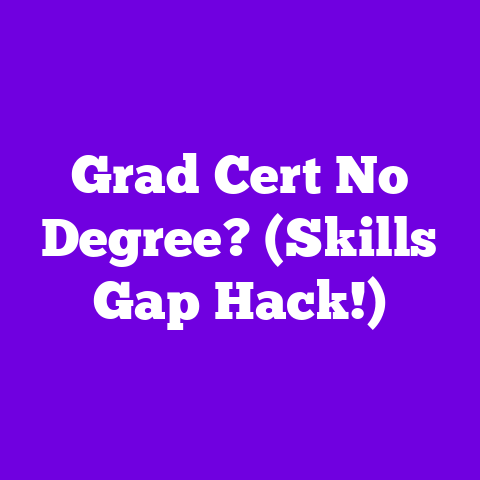Teach with a Bachelor’s Degree? (Licensure Secrets!)
The world of education is constantly changing, and keeping up can feel like a whirlwind.
But don’t worry, I’m here to help you navigate the ins and outs of teaching with a bachelor’s degree.
Let’s dive into the real deal about licensure, job prospects, and how to make your mark in the classroom.
Section 1: Debunking Durability Myths
So, let’s get real. There are some serious myths floating around about how “durable” a teaching degree is.
Discuss Common Misconceptions
A common one I hear is that a bachelor’s in education is somehow “less” than other degrees.
People often think you need a master’s to really be taken seriously. But is that really true?
Let’s break it down.
Many believe that teaching degrees aren’t as valuable in today’s job market.
They think that because of increased competition, advanced degrees are a must-have.
However, I’ve seen countless teachers with bachelor’s degrees absolutely thrive.
They bring passion, dedication, and innovative teaching methods that make a real difference.
Plus, according to the U.S.
Bureau of Labor Statistics, the median annual wage for high school teachers was $62,870 in May 2023.
While this varies by state and experience, it shows that teaching is a viable and valuable profession.
Historical Context
Let’s take a quick trip down memory lane.
Back in the day, a bachelor’s was often the gold standard for teaching.
But over the years, the landscape shifted. More emphasis was placed on advanced degrees, and the perception changed.
I remember when master’s degrees started becoming more common, especially in competitive districts.
It felt like the bar was being raised.
But here’s the thing: while advanced degrees can open doors, they aren’t always a necessity.
Case Studies
Let me tell you about Sarah, a high school English teacher I know.
She has a bachelor’s degree in English Education and has been teaching for 10 years.
She’s amazing! Her students consistently score high on standardized tests, and she’s a mentor to many new teachers.
Then there’s Mark, an elementary school teacher with a bachelor’s in early childhood education.
He creates such a fun and engaging learning environment that his students absolutely love coming to school.
These are just two examples of educators who have made a huge impact with just a bachelor’s degree.
It’s about what you bring to the table, not just the letters after your name.
Section 2: Understanding
Teacher Licensure
Okay, let’s talk about the nitty- gritty: licensure.
It’s like the golden ticket to teaching, but getting it can be a bit confusing.
Overview of Licensure
Requirements
Each state has its own rules and regulations. It’s like 50 different games with slightly different rulebooks!
Generally, you’ll need to complete a bachelor’s degree in education or a related field, complete a teacher preparation program, and pass a licensure exam.
For example, in California, you need to pass the California Basic Educational Skills Test (CBEST) and the California Subject Examinations for Teachers (CSET).
Meanwhile, in New York, you’ll need to pass the New York State Teacher Certification Examinations (NYSTCE).
See what I mean? Different states, different tests.
Public schools usually have stricter requirements than private schools.
Public schools often require state- issued licenses, while private schools might have more flexibility.
Alternative Paths to Licensure
Don’t have a traditional education degree? No worries! There are alternative paths to licensure.
Many states offer programs for career changers or those with degrees in other fields.
These programs usually involve intensive training and supervised teaching experience.
For instance, Teach For America is a well-known program that places teachers in underserved communities.
Additionally, some states offer emergency credentials to address teacher shortages.
These are temporary licenses that allow you to teach while completing the necessary requirements for full licensure.
Section 3: The Importance of
Accreditation
Accreditation: it’s a big word, but it’s super important.
Think of it like a stamp of approval for your program.
Accredited Programs
Attending an accredited institution is crucial for a few reasons.
First, it ensures that your program meets certain quality standards.
Second, it affects your eligibility for licensure.
Most states require you to graduate from an accredited program to be eligible for a teaching license.
The Council for the Accreditation of Educator Preparation (CAEP) is a major accrediting body for teacher education programs.
State-Specific Accreditation
Here’s where it gets a little tricky.
Some states have their own accreditation standards that go above and beyond national standards.
For example, in Texas, the State Board for Educator Certification (SBEC) oversees the accreditation of teacher preparation programs.
If you’re planning to teach in a specific state, make sure to check their specific accreditation requirements.
Section 4: Future Trends in
Education
The future of education is here, and it’s all about tech and new ways of thinking.
Technological Advancements
Technology is changing everything, including teaching. Online teaching, blended learning, and digital resources are becoming more and more common.
Teachers need to be tech-savvy and comfortable using various digital tools.
Think interactive whiteboards, online learning platforms, and educational apps.
According to a study by the National Education Association, 93% of teachers believe that technology has the potential to transform teaching.
Shifts in Educational Philosophy
We’re also seeing a shift towards student-centered learning and social-emotional learning (SEL).
Student-centered learning puts the focus on the student’s needs and interests. It’s about creating a personalized learning experience.
SEL focuses on developing students’ emotional intelligence and social skills. It’s about creating a supportive and inclusive classroom environment.
These trends mean that teachers need to be adaptable, empathetic, and skilled in creating engaging and relevant learning experiences.
Section 5: The Role of
Professional Development
Never stop learning! That’s my motto, and it’s especially true for teachers.
Continued Education
Ongoing professional development is essential for teachers, especially those with bachelor’s degrees.
It helps you stay up-to-date on the latest teaching methods, technologies, and educational trends.
There are tons of programs, workshops, and certifications available.
Look into workshops that focus on new teaching methods or technology integration.
Many school districts offer professional development opportunities for their teachers. Take advantage of these resources!
Networking and Mentorship
Building a professional network and seeking mentorship can be incredibly helpful, especially when you’re just starting out.
Connect with other teachers at conferences, workshops, and online forums.
Share ideas, ask questions, and learn from each other’s experiences.
A mentor can provide guidance, support, and advice as you navigate the challenges of the teaching profession.
Section 6: The Hiring Landscape
in 2025
Let’s peek into the future and see what the job market looks like for teachers in 2025.
Job Market Analysis
The demand for teachers is expected to remain strong in the coming years, particularly in certain subjects and grade levels.
According to the U.S.
Department of Education, there is a shortage of teachers in areas like special education, math, science, and bilingual education.
The need for qualified teachers is especially acute in underserved communities.
Employer Expectations
Employers are looking for candidates with a strong academic background, excellent communication skills, and a passion for teaching.
They also want to see evidence of your ability to create engaging and effective lesson plans, manage a classroom, and work collaboratively with colleagues.
Highlight your skills, experience, and personal attributes in your resume and cover letter.
Be sure to showcase your passion for teaching and your commitment to student success.
Section 7: Success Stories and
Testimonials
Let’s hear from some real teachers who are rocking it with their bachelor’s degrees!
Interviews with Educators
I recently spoke with Maria, a middle school math teacher with a bachelor’s in mathematics education.
She said, “I was worried that not having a master’s would hold me back, but I’ve found that my passion and dedication have made all the difference.
I focus on building strong relationships with my students and creating a supportive learning environment.”
Then there’s David, an elementary school science teacher with a bachelor’s in biology.
He shared, “I’ve learned so much from my colleagues and mentors.
Networking and professional development have been key to my success.
Don’t be afraid to ask for help and keep learning!”
Impact on Students
The impact that teachers have on their students’ lives is immeasurable.
I’ve seen countless examples of teachers who have gone above and beyond to support their students’ academic and personal growth.
Teachers inspire, motivate, and empower their students to reach their full potential.
They create a positive and supportive learning environment where students feel safe, valued, and respected.
Conclusion
So, can you teach with a bachelor’s degree in 2025? Absolutely!
While there may be challenges, there are also numerous opportunities for those who are passionate about teaching and committed to making a difference in the lives of their students.
Remember to focus on gaining practical experience, seeking professional development, and building a strong professional network.
With hard work, dedication, and a passion for teaching, you can achieve your dreams of becoming a successful educator.






